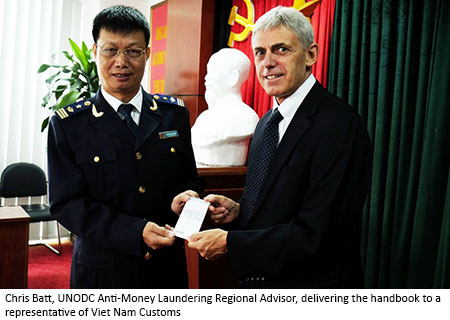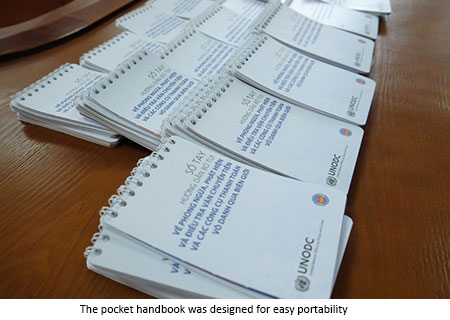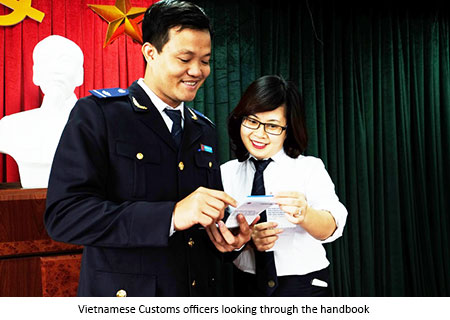New handbook offers assistance for Viet Nam Customs to combat money laundering

Hanoi (Viet Nam), 19 November 2015 - Money laundering is a serious threat to many countries in Southeast Asia. Deficient legal frameworks and cash based economies make the region susceptible to money laundering activities. This can assist transnational organized crime networks, as well as terrorist groups, to finance their activities and, accordingly, substantive steps need to be taken to strengthen anti-money laundering efforts in the region.
To work towards this goal, UNODC has delivered a handbook entitled "Prevention, Detection and Investigation of Cash Couriers and Bearer Negotiable Instruments across Borders" to Vietnamese Customs. The handbook includes specialized techniques for identifying, detecting and investigating cash smuggling and money laundering crimes.
UNODC experts, with the support of comments made by Viet Nam Customs, wrote the handbook. It is designed to assist front-line customs officers to prepare for detecting cash and anonymous payments into and out of the country. Towards this end, the manual offers criminal intelligence guidance for cash analysis, smuggling signals and passenger evaluation. In addition, it provides a wealth of information about how to evaluate passengers, raise strategic questions, conduct cash forensics, and develop investigations.

The handbook will assist Viet Nam's Customs in meeting international standards as according to recommendation No. 32 from the Financial Action Task Force (FATF), it is necessary that countries have measures in place to detect the physical cross-border transportation of currency and bearer negotiable instruments.
"In the context of anti-money laundering policies, it is becoming more difficult for criminals to use banking services to launder their illegal proceeds. Therefore, they may choose a more traditional way of smuggling cash across borders. It is important for frontline officers to equip themselves with the latest techniques to detect the crime of cash smuggling," said Chris Batt, UNODC Anti-Money Laundering and Counter Financing Terrorism Regional Advisor.
"Money laundering poses increasingly dangerous threats to the Member States in the region. This is due, in part, to several jurisdictions being cash-based economies, the existence of weak border controls at some borders and a low law enforcement focus on cash smuggling and money laundering in certain parts of the world. We hope that with the pocket guide, and the comprehensive tips inside, it will help to build the capacity of customs and border control agencies and combat cross-border money laundering crimes." added Mr. Batt.

This is one of UNODC's efforts to strengthen anti-money laundering efforts in Viet Nam. Throughout the years, UNODC has implemented different activities to assist Viet Nam in detecting, seizing and confiscating illicit proceeds. In the coming months, UNODC will continue to work with Vietnam counterparts to improve their response to financial crimes.


